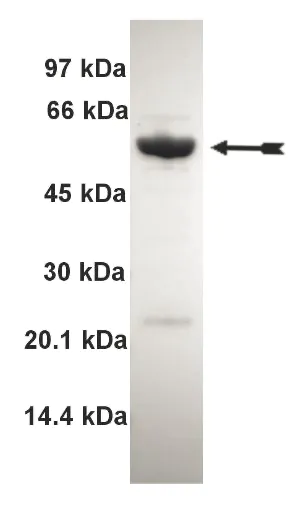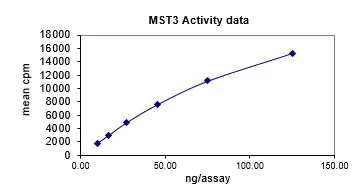MST3, active Human Recombinant Kinase Protein
N-terminal GST-tagged recombinant, human MST3 amino acids 1-304.
Biological information
Background
MST3 (Mammalian sterile 20-like kinase 3) is a serine/threonine protein kinase that belongs to the sterile 20 (STE20) family of kinases. It is involved in a variety of cellular processes, including cell cycle progression, cell migration, and apoptosis. Research has suggested that MST3 plays a role in several diseases, including cancer, neurodegenerative diseases, and cardiovascular diseases. It has been shown to promote cancer cell proliferation and survival, and inhibition of MST3 has been suggested as a potential cancer therapy. Additionally, MST3 has been implicated in the regulation of neuronal survival and synaptic plasticity, making it a potential target for the treatment of neurodegenerative diseases such as Alzheimer's and Parkinson's disease.
Target class
Kinase
Family
STE
Accession number
NM_001032296.2; NM_003576.3
Target Name
MST3, active Human Recombinant Kinase Protein
Target Alias
STK24, MST3B, MST3, MST-3, STK3
Origin
Human
Theori. MW
61.2 kDa
Affinity tag
GST
Product specifications
Expression system
Expressed by baculovirus in Sf21 insect cells
Purity
Purity 98.5% by SDS-PAGE and Coomassie blue staining.
Purification method
Glutathione agarose affinity chromatography
Sample Buffer
Protein in 50mM Tris/HCl pH7.5,
300mM NaCl, 0.1mM EGTA, 0.03% Brij-35, 270mM sucrose,
1mM benzamidine, 0.2mM PMSF, 0.1% 2-mercaptoethanol.
Frozen solution.
Specified activity
Refer to CoA
Application
For Research Only
Storage conditions
6 months at -70°C
Usage disclaimer
For Research Only
Chemical data
Background
MST3 (Mammalian sterile 20-like kinase 3) is a serine/threonine protein kinase that belongs to the sterile 20 (STE20) family of kinases. It is involved in a variety of cellular processes, including cell cycle progression, cell migration, and apoptosis. Research has suggested that MST3 plays a role in several diseases, including cancer, neurodegenerative diseases, and cardiovascular diseases. It has been shown to promote cancer cell proliferation and survival, and inhibition of MST3 has been suggested as a potential cancer therapy. Additionally, MST3 has been implicated in the regulation of neuronal survival and synaptic plasticity, making it a potential target for the treatment of neurodegenerative diseases such as Alzheimer's and Parkinson's disease.
Compound name
Kinase
Catalog number
14-695
Molecular formula
CAS
MW
Ka
Percent composition
Product specifications
Physical state
Purity (HPLC 214nm)
Retention time (RP18 HPLC)
CMC
Exact mass
Stability
For Research Only
Solubility structure
Kinase Activity Assay Biological information
Background
MST3 (Mammalian sterile 20-like kinase 3) is a serine/threonine protein kinase that belongs to the sterile 20 (STE20) family of kinases. It is involved in a variety of cellular processes, including cell cycle progression, cell migration, and apoptosis. Research has suggested that MST3 plays a role in several diseases, including cancer, neurodegenerative diseases, and cardiovascular diseases. It has been shown to promote cancer cell proliferation and survival, and inhibition of MST3 has been suggested as a potential cancer therapy. Additionally, MST3 has been implicated in the regulation of neuronal survival and synaptic plasticity, making it a potential target for the treatment of neurodegenerative diseases such as Alzheimer's and Parkinson's disease.
Target class
Kinase
Family
STE
Subfamily
Protein Name
MST3
Protein Alias
STK24, MST3B, MST3, MST-3, STK3
Accession Number
NM_001032296.2; NM_003576.3
UniProt Number
Gene Name
Gene ID
Gene Aliases
Target Species
Human
Kinase Activity Assay Usage
Product Type
Application
Storage Conditions
6 months at -70°C
Usage disclaimer
Kinase Activity Assay Information
Assay Type
Assay Measures
Biological Information
Background
MST3 (Mammalian sterile 20-like kinase 3) is a serine/threonine protein kinase that belongs to the sterile 20 (STE20) family of kinases. It is involved in a variety of cellular processes, including cell cycle progression, cell migration, and apoptosis. Research has suggested that MST3 plays a role in several diseases, including cancer, neurodegenerative diseases, and cardiovascular diseases. It has been shown to promote cancer cell proliferation and survival, and inhibition of MST3 has been suggested as a potential cancer therapy. Additionally, MST3 has been implicated in the regulation of neuronal survival and synaptic plasticity, making it a potential target for the treatment of neurodegenerative diseases such as Alzheimer's and Parkinson's disease.
Target class
Kinase
Family
STE
Accession Number
NM_001032296.2; NM_003576.3
Target Name
MST3
Target Alias
STK24, MST3B, MST3, MST-3, STK3
Origin
Human
Theoretical MW
Affinity Tag
GST
Product Specifications
Expression system
Expressed by baculovirus in Sf21 insect cells
Purity
Purity 98.5% by SDS-PAGE and Coomassie blue staining.
Purification method
Glutathione agarose affinity chromatography
Sample Buffer
Specified activity
Refer to CoA
Application
Storage conditions
6 months at -70°C
Usage disclaimer
For Research Only
Biological Information
Background
MST3 (Mammalian sterile 20-like kinase 3) is a serine/threonine protein kinase that belongs to the sterile 20 (STE20) family of kinases. It is involved in a variety of cellular processes, including cell cycle progression, cell migration, and apoptosis. Research has suggested that MST3 plays a role in several diseases, including cancer, neurodegenerative diseases, and cardiovascular diseases. It has been shown to promote cancer cell proliferation and survival, and inhibition of MST3 has been suggested as a potential cancer therapy. Additionally, MST3 has been implicated in the regulation of neuronal survival and synaptic plasticity, making it a potential target for the treatment of neurodegenerative diseases such as Alzheimer's and Parkinson's disease.
Target class
Kinase
Family
STE
Accession Number
NM_001032296.2; NM_003576.3
Target Name
MST3
Target Alias
STK24, MST3B, MST3, MST-3, STK3
Origin
Human
Theoretical MW
Affinity Tag
GST
Product Specifications
Expression system
Expressed by baculovirus in Sf21 insect cells
Purity
Purity 98.5% by SDS-PAGE and Coomassie blue staining.
Purification method
Glutathione agarose affinity chromatography
Sample Buffer
Specified activity
Refer to CoA
Application
Storage conditions
6 months at -70°C
Usage disclaimer
For Research Only





